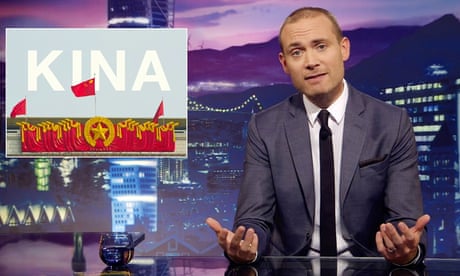Beijing’s message to Sweden and beyond – criticise us, and we’ll topple your agenda – won’t win it any hearts and minds
By David Bandurski
Screengrab from the ‘video that purported to show the ‘brutal treatment’ of three Chinese tourists at a hotel in Stockholm’.
Two days after Sweden’s election in September, a bizarre statement appeared in English on the website of the Chinese embassy in Stockholm.
A “small handful of Swedish forces, media and individuals”, it said, had made “unwarranted claims” of Chinese interference in the Swedish vote.
These were “groundless accusations”, and a “malicious attack and smear against China”.
The strangest thing of all: no one in Sweden had the slightest inkling what the statement referred to.

Beijing protests Swedish TV satire about barbaric Chinese tourists
As an expert on China’s official discourse who also studies its influence in Europe, I too struggled to make sense of this storm in a teapot – until a few days later, when a new tempest whirled into view. This time, Sweden noticed.

Beijing protests Swedish TV satire about barbaric Chinese tourists
As an expert on China’s official discourse who also studies its influence in Europe, I too struggled to make sense of this storm in a teapot – until a few days later, when a new tempest whirled into view. This time, Sweden noticed.
The source of the fresh controversy was an online video that purported to show the “brutal treatment” of three Chinese tourists at a hotel in Stockholm.
As I read the "angry" comments from China’s foreign ministry, it suddenly all made perfect sense.
The expressions of "outrage" were part of a concerted diplomatic strategy of hyperbole and distraction.
In the video, the tourists – identified as Zeng and his two parents – are carried from the hotel by police officers, and deposited on the pavement outside as the son screams in English: “This is killing! This is killing!”
In the video, the tourists – identified as Zeng and his two parents – are carried from the hotel by police officers, and deposited on the pavement outside as the son screams in English: “This is killing! This is killing!”
The mother sits on the pavement and wails: “Save me!”
According to a local newspaper, Aftonbladet, the tourists had arrived at the hotel the night before their scheduled booking and asked to remain in the lobby through the night.
They disregarded repeated requests to leave, remaining instead on the lobby sofas.
One eyewitness said the police remained calm as the Chinese family grew agitated.
The son, this source said, acted particularly oddly, “throwing himself flat on the ground”.
Quoted by local media, a Swedish prosecutor later said: “We made the assessment that no crime on the part of the police had been committed.”
The Chinese embassy, in a statement on 15 September, insisted that the tourists had been “brutally abused by the Swedish police”, which had “severely endangered the life and violated the basic human rights of Chinese citizens”.
Many Chinese people who viewed the video clips on domestic social media platforms were furious about what they saw as mistreatment.
The Chinese embassy, in a statement on 15 September, insisted that the tourists had been “brutally abused by the Swedish police”, which had “severely endangered the life and violated the basic human rights of Chinese citizens”.
Many Chinese people who viewed the video clips on domestic social media platforms were furious about what they saw as mistreatment.
But others saw something different: a familiar pattern of using over-dramatisation as a means of recourse for imagined injustice.
Called “porcelain bumping”, or pengci, this pattern became a focus of attention as the hubbub over the Stockholm incident continued in China.
Pengci refers to the practice of manufacturing drama to obtain a desired outcome.
The term was coined to describe a technique used by fraudsters who would wait with delicate porcelain vessels outside busy markets and demand payment when these shattered, ostensibly due to the carelessness of others.
Now, pengci often refers to the act of throwing oneself into oncoming traffic in order to claim compensation – a practice so common in China that related compilations of clips online are now nearly as ubiquitous as cat videos.
Still, the Chinese embassy in Sweden continued to depict the incident as a grave case of human rights abuse.
Still, the Chinese embassy in Sweden continued to depict the incident as a grave case of human rights abuse.
The foreign ministry’s position was parroted by state-run media.
One article shared by a social media account of the People’s Daily alleged that talk of “porcelain bumping”, and other attempts to minimise the Stockholm incident, had been cooked up overseas by Falun Gong, a spiritual movement that the Chinese government has labelled an enemy.
At this point official Chinese outrage had moved on to a skit aired on 21 September on a satirical show by the Swedish national broadcaster, SVT, that made light of the incident.
At this point official Chinese outrage had moved on to a skit aired on 21 September on a satirical show by the Swedish national broadcaster, SVT, that made light of the incident.
A statement from the Chinese embassy said the skit had “breached the basic moral bottom line of humankind”.
Moreover, it had “seriously infringed on Chinese sovereignty and territorial integrity” by projecting a map behind the host that did not show Taiwan and Tibet as an integral part of China.
This came at an already tense time in the bilateral relationship.
This came at an already tense time in the bilateral relationship.
The Dalai Lama had visited Sweden just days before the video of the tourists appeared.
Another sore point was China’s continued imprisonment of a Hong Kong-based bookseller, Gui Minhai, who is a Swedish citizen.
Oscar Almén, a researcher at Uppsala University, told Radio Sweden: “The Chinese embassy is now actively trying to deliver a message to the Swedish media and the public.”
That message is a solemn promise to government and society in Europe and beyond: wherever you seek to criticise our policies or forestall our ambitions, we will topple your agenda. We will shatter the porcelain of diplomatic composure and fan the anger of our population with debased facts until every issue you raise is about just one issue – China’s national "dignity".
Earlier this month “broken porcelain” diplomacy moved on to the British Conservative party’s annual conference in Birmingham, as a journalist from state-owned China Central Television shouted down a panellist at an event on Hong Kong organised by the party’s human rights committee, which was attended by prominent members of the pro-democracy community in Hong Kong.
That message is a solemn promise to government and society in Europe and beyond: wherever you seek to criticise our policies or forestall our ambitions, we will topple your agenda. We will shatter the porcelain of diplomatic composure and fan the anger of our population with debased facts until every issue you raise is about just one issue – China’s national "dignity".
Earlier this month “broken porcelain” diplomacy moved on to the British Conservative party’s annual conference in Birmingham, as a journalist from state-owned China Central Television shouted down a panellist at an event on Hong Kong organised by the party’s human rights committee, which was attended by prominent members of the pro-democracy community in Hong Kong.
As the woman was confronted and asked to leave, she apparently slapped a student volunteer.
She shouted, “How democratic [is the] UK!” as she was being escorted out.
The Chinese embassy in London demanded an apology.
The Chinese embassy in London demanded an apology.
And while it made a fuss about the reporter’s rights, it also pointed out, in a statement, that “any plot or action conspiring to divide China is contrary to the current of history”.
Discussion of Hong Kong’s future, in other words, was to be avoided.
The pattern is clear.
The pattern is clear.
When it comes to foreign criticism of the Chinese government, or to the strategic issues it cares about, we’re all tiptoeing through a china shop now.
The danger is that such histrionics could make European governments, universities, scholars and journalists, to remain silent, retreat from issues likely to prompt an outburst.
Europe must send a message that it welcomes free, open and calm discussion of all issues, and that it will not suspend its values or the rights of its citizens to appease China’s official bouts of staged anger.
If we refuse to indulge such tactics, China’s government will eventually come to understand what many of its citizens already know – that you don’t win hearts or minds through intimidation.



